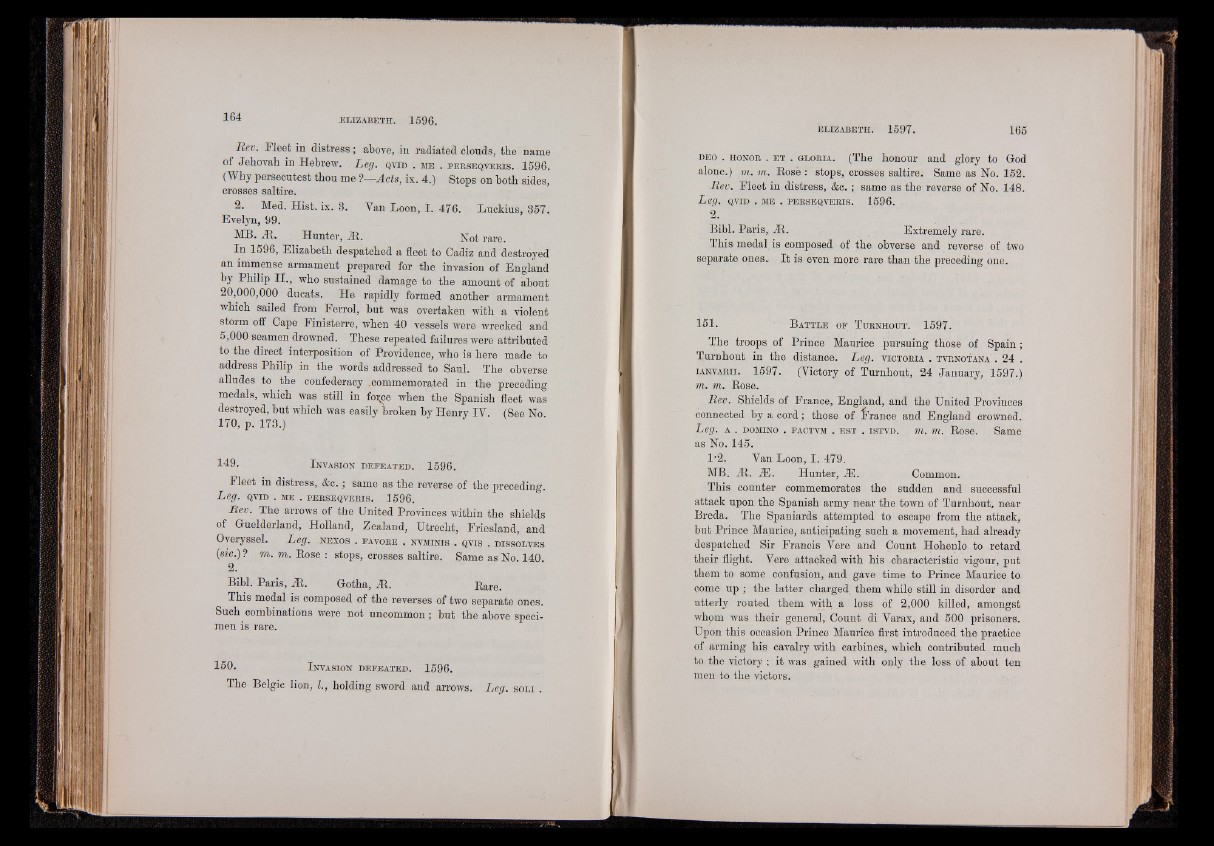
Rev. Fleet in distress; above, in radiated clouds, the name
of Jehovah in Hebrew. Leg. q v id . m e . p e r s e q v e r i s . 1596.
(Why persecutest thou me ?—Acts, ix. 4.) Stops on both sides,
crosses saltire.
2. Med. Hist. ix. 8. Yan Loon, I. 476. Luckius, 357.
Evelyn, 99.
MB. HI. Hunter, Ht. Not rare.
In 1596, Elizabeth despatched a fleet to Cadiz and destroyed
an immense armament prepared for the invasion of England
by Philip II., who sustained damage to the amount of about
20,000,000 ducats. He rapidly formed another armament
which sailed from Ferrol, but was overtaken with a violent
stoim oif Cape Finisterre, when 40 vessels were wrecked and
5,000 seamen drowned. These repeated failures were attributed
to the direct interposition of Providence, who is here made to
address Philip in the words addressed to Saul. The obverse
alludes to the confederacy .commemorated in the preceding
medals, which was still in foi^e when the Spanish fleet was
destroyed, but which was easily broken by Henry IV. (See No
170, p. 173.)
149. I n v a s i o n d e f e a t e d . 1596.
Fleet in distress, &c.; same as the reverse of the preceding.
Leg. q v id . m e . p e r s e q v e r i s . 1596.
Rev. The arrows of the United Provinces within the shields
of Guelderland, Holland, Zealand, Utrecht, Friesland, and
Overyssel. Leg. n e x o s . f a v o b e . n vm in is . q v i s . d i s s o l v e s
(sic.)? to. to. Bose : stops, crosses saltire. Same as No. 140
2.
Bibl. Paris, M. Gotha, Ht. Rare.
This medal is composed of the reverses of two separate ones.
Such combinations were not uncommon; but the above specimen
is rare.
1 5 0 . I n v a s i o n d e f e a t e d . 1596.
The Belgic lion, I., holding sword and arrows. Leg. s o l i
DEO . h o n o r . ET . g l o r i a . (The honour and glory to God
alone.) to. to. Rose : stops, crosses saltire. Same as No. 152.
Rev. Fleet in distress, &c.; same as the reverse of No. 148.
Leg. q v id . m e . p e b s e q v e r i s . 1596.
2.
Bibl. Paris, iR. Extremely rare.
This medal is composed of the obverse and reverse of two
separate ones. It is even more rare than the preceding one.
151. B a t t l e o f T u r n h o u t . 1597.
The troops of Prince Maurice pursuing those of Spain ;
Turnhout in the distance. Leg. v i c t o r i a . t v r n o t a n a . 24 .
i a n v a r i i . 1597. (Victory of Turnhout, 24 January, 1597.)
to. to. Rose.
Rev. Shields of France, England, and the United Provinces
connected by a cord; those of i ’rance and England crowned.
Leg. a . d om in o . f a c t v m . e s t . i s t v d . to. to. Rose. Same
as No. 145.
1'2. Van Loon, I. 479.
MB. iR. M. Hunter, M. Common.
This counter commemorates the sudden and successful
attack upon the Spanish army near the town of Turnhout, near
Breda. The Spaniards attempted to escape from the attack,
but Prince Maurice, anticipating such a movement, had already
despatched Sir Francis Vere and Count Hohenlo to retard
their flight. Vere attacked with his characteristic vigour, put
them to some confusion, and gave time to Prince Maurice to
come up ; the latter charged them while still in disorder and
utterly routed them with a loss of 2,000 killed, amongst
whom was their general, Count di Varax, and 500 prisoners.
Upon this occasion Prince Maurice first introduced the practice
of arming his cavalry with carbines, which contributed much
to the victory ; it was gained with only the loss of about ten.
men to the victors.